Author: Susan George
M.E. Steelman • Director of Church Life and Connection
August 24, 2023The start of a new program year is exciting in so many ways, especially here at the church. The month of September will have our building buzzing with excitement as we welcome everyone back to our classrooms, small group gatherings, and fellowship opportunities. I have no doubt that God’s presence will be felt by all as we continue to prepare for and enjoy the start of another program year at Derry Church.
Not only will the life of the church feel more vibrant with the program year getting under way, you’ll likely feel the rest of your life coming alive as everyone moves away from the slower pace that summer typically brings. So how do you choose what to join, how to fit in, and where to find information on church life and programming? Read on for answers to some of those questions.
What types of programs can I expect?
Derry’s planning teams are working hard to provide a variety of learning and gathering opportunities for Sunday mornings and throughout the week for all ages to enjoy. Sunday mornings this fall will include Sunday School for all ages, choir rehearsal, and 11-Minute Lessons.
Throughout the week we offer a variety of small groups studies so that you can find a group that fits your schedule. You can find fellowship on Monday afternoons, Tuesday evenings and Sundays after worship as we offer opportunities for church and community members. Tuesday evenings include delicious hot dinners in Fellowship Hall for all to enjoy, music and creative arts for our children & youth (preschool-12th grade), and worship in the Chapel.
How can I learn more about all of the different programs Derry Church offers?
The best resource is our church eNewsletter. We try to include all that is happening in this weekly publication. We have also been adding the schedule to the Sunday bulletin and have printed copies of the eNews available on the information desk in the Narthex.
If you are looking for information specific to youth, contact Pastor Stephen. For children, email me and ask to be added to the regular newsletters we share with all that is happening for these specific age groups.
Why is it important for me to be involved in more than Sunday worship?
Growing your faith is a lifelong journey. Our faith experiences become greater and more meaningful when we gather with others to learn, share, wrestle and prepare for the ups and downs of life. Gathering for worship can help us feel ready to face the start of a week with new thoughts and good intentions. But often life can quickly overtake those thoughts and intentions, and before we know it we are sitting in worship again and realizing we haven’t invited God to join us throughout the week. There are also times when life’s ups and downs will leave us needing or craving help and care from our church friend. Derry’s various programs are not only created for learning and sharing, they are designed to help us strengthen our relationships with one another.
How do I get involved?
Simple: come! Whether you are a parent who wants to help your children or youth grow their faith, or you are an adult looking to challenge and explore your faith, or you are looking for connections with others, all of our programs are designed to welcome you when you are able to join us. I encourage you to step out from the craziness or loneliness of life and carve out time to explore your faith and grow your relationship with God and with your church family.
What if I’m just too busy right now?
We all go through seasons of life when time works against us and keeps us from being able to be more involved. That does not mean our faith journey needs to be put on pause or moved to the back burner. We can still explore our faith. Over the last few weeks, we have begun to include faith questions in the bulletin and eNews and at the start of staff and committee meetings. These questions are designed to help us pause and reflect as we spend a few minutes with ourselves to discover how God is finding us in our daily lives. Questions can be answered while sitting alone, sitting in worship, or talked about at church and family gatherings. We hope they spark something within you that allows you to open your heart and mind even more.
What if I have questions about Derry’s various programs or want more information about how to get involved?
Please call (717-533-9667), send an email, stop by the church office, or talk with our staff members on Sundays to learn more about any of our church programs and how you can get involoved.
I look forward to seeing you soon!
Beckie Freiberg • Faith Community Nurse
August 17, 2023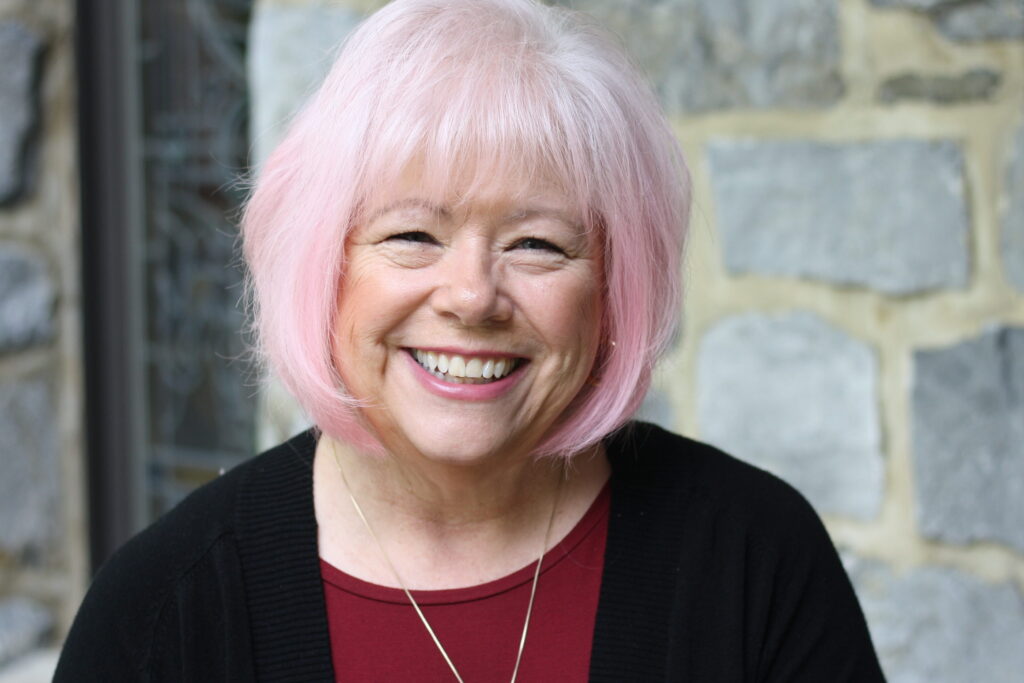
On May 14 I had the honor of being commissioned as Derry’s first Faith Community Nurse. What an exciting day! I had always dreamed of doing some sort of health ministry with my nursing skills, and now I’m on my way.
Many of you may be wondering about the role of a Faith Community Nurse (FCN). What are her responsibilities? How can she help me?
A FCN Is a subset of nursing like pediatrics, medical surgical, women’s health, cardiovascular care, and more. This speciality is subject to its own Scope and Standards of Practice and is required to adhere to these standards including confidentiality. I will soon be taking an extensive course for FCN and will receive my certification.
A FCN works within a faith community and incorporates health, wellness, and spirituality into her practice. I can do this by teaching about different health topics, teaching and encouraging wellness practices, acting as a resource person, and incorporating spirituality into these teachings. I can also help you navigate today’s complex healthcare systems. In my role as a FCN, I can provide counsel on a variety of issues and help to seek solutions, and offer a listening ear. Home and long term care facilities visits, hospital visits, as well as phone calls and follow-up calls after surgery are also a part of my duties. If you need community resources, I can help guide you to those services.
I can review medications with you and make suggestions on how to take them. Nursing assessments of different situations are also part of my role. If you have a health question, I can help with that and I can do some health assessments and screening tests, such as take blood pressures and offer advice. Some of the things that I cannot do are hands-on nursing care (things like basic physical care or placing meds into containers for ease of remembering to take them).
At Derry, I am partnering with the new Health and Wellness Committee, using their knowledge to act as a health and wellness guide for our church family. “Health Time with Nurse Beckie” is a new educational program I’m offering on Zoom on the fourth Wednesday of each month. Join me as I present a health topic followed by discussion and questions. The first session is Wednesday, August 23 at 1 pm. I’ll be talking about ticks and lyme disease. Click this link to join the conversation.
I am very excited about this new role at Derry Church and I look forward to meeting each and every one of you and getting to know you. Please reach out with your suggestions and any questions. I’m happy to take calls and make visits. You can contact me through the church office (717-533-9667) or reach out by email: care@derrypres.org.
I feel so blessed that God and Derry Church have called me to this ministry, and I thank you for the opportunity to serve this congregation.
Katie Steelman • Derry Youth
August 10, 2023Editor’s Note: Last month a group of Derry Church youth and leaders spent a week in Niagara Falls, NY on a mission and fellowship adventure. What follows are Kate’s reflections on that experience.
What was your impression on what you saw in Niagara Falls?
I did not expect Niagara Falls (the city) to be so run down and deserted. Leaving the amazing falls and then driving down an abandoned Main Street is something I will never forget.
What did you do on the mission trip?
We had the chance to work at Community Missions in their soup kitchen and food pantry. It felt really good to talk with people who came to pick up food for their family and to help them load everything into their cars. I will never forget the smile on one woman’s face when I handed her a bouquet of flowers. Everyone was so thankful for our help.
We also served at Center City and got to assist people at their homes. We met a woman who had a fire in her home and we were able to help her work in her yard to make it look nice even though her house was still being fixed up after the fire. We also met a man who needed help cleaning up his property and we worked to transform all the overgrown gardens and make the yard look really nice for him.
Some of our group spent two days at Holy Trinity, a former Catholic church that is now a historical site. The church was built in the early 1900s by a Polish community and has so much amazing history. Marge, the lady who now cares for the whole property and runs the mission organization that is housed there, very much appreciated our help with the yard work and preparing it for their upcoming Polish Polka Festival fundraiser that raises the funds needed to keep the historical site going.
What is your favorite memory from this youth mission trip?
Our last night in Niagara Falls our group had free time together and we had a lot of fun exploring the falls. We visited a park and took sunset pictures, did some souvenir shopping, saw Niagara Falls lit up at nighttime and saw fireworks over the falls. It was a super fun way to end our mission week.
How do you see your life differently now that you are back home?
I look forward to helping others more than I did before. I hope that our youth group will find ways to help make a difference in our own community.
Would you want to go on another trip? Why or why not?
Yes! I enjoyed this mission experience and having the opportunity to meet youth from other churches. I look forward to going on more mission trips in the years to come.
In case you missed it: click here to watch a short video of the group’s adventures in Niagara Falls.
Andy Phillips • CEO/HEAD OF SCHOOL, LOGOS ACADEMY HARRISBURG
August 3, 2023Editor’s Note: On the first Thursday of each month, the eNews feature article showcases one of our mission partners. In August we’re focusing on Education of Children and the good work happening at Logos Academy Harrisburg.
Kirk Hallet, founder of the Joshua Group, often said that education is the best anti-poverty program. Statistics bear that out. A study by the American Educational Research Association found that a student who can’t read on grade level by third grade is four times less likely to graduate by age 19 than a child who reads proficiently by that time. Without a high school diploma, a student is twice as likely to be in poverty as one with a high school diploma and more than five times as likely as one with a college degree, according to a recent UC Davis study.
Derry Church’s partnership with Logos Academy Harrisburg enables us to provide a quality and compassionate education in a Christ-centered environment, thus addressing poverty and equipping tomorrow’s leaders. With 43% of our students (Pre-K to third in 2022-23) in poverty and another 22% near poverty, we are seeing the impact. Grayson has grown from a struggling student in first grade to excelling in second grade, far exceeding his growth and stretch goals. He has become such a good reader that his grandmother says she has to hide her phone, because he “reads over my shoulder.” Further, she adds, “he has come out of his shell.” She credits his school for this growth. She is rightfully proud of his academic growth but equally proud of his growth in character. That is the goal of true education, according to Martin Luther King, Jr.
Logos Academy Harrisburg’s math and reading test scores are good and helpful indicators, but this is not the only important or even the most important priority in education as a predictor of future success, according to Ross Wiener of the Aspen Institute (USA Today.) Being creative and critical thinkers with a high degree of integrity and character is a much better indicator of long-term success in life.
The education model of Logos Academy Harrisburg is designed so that every student grows. As with many other schools, our students are at varying levels of academic proficiency and social/emotional development. Our individualized approach allows all students to experience success. “Elaine” is several grade levels behind. Math is challenging; reading is challenging; but she is growing. Testing her simply for grade-level proficiency would be discouraging, at best. However, testing her for growth is motivating, because she is growing. She is succeeding because she is meeting her growth goals. The result? “Elaine” is learning to love learning.
We are thankful for our partnership with Derry Church, whose investment in our students is already paying dividends and will continue to do so for these young learners for years to come.
Julie Miller • Derry Member
July 27, 2023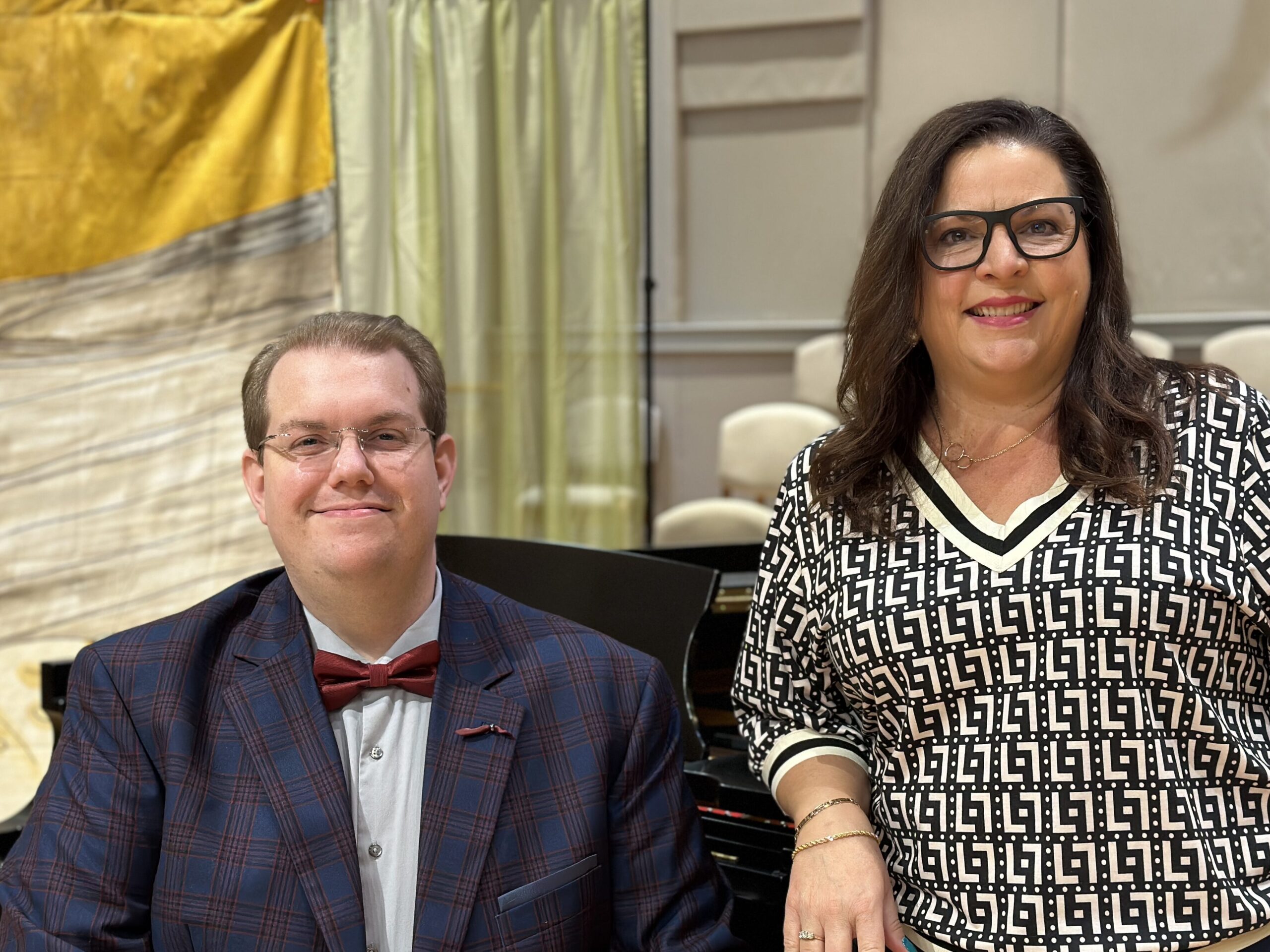
“We proclaim God’s word, share God’s love, and practice God’s justice.”
These are familiar words to those of us who are members of Derry Church. However, I believe that the words that often follow our mission statement are absolutely as important, and they are the reasons that we can boldly act on our mission.
“…through being an inquiring, inviting, and inclusive Christ-centered community.”
In 2004 when I moved with my young family from Virginia to Hershey, one of the most important things for us to do was find a home in a community of faith. As one does when moving to another area, I began attending Sunday mornings at different churches. I will never forget the sense of welcome that I felt at Derry on that first Sunday. Not only were so many members friendly and kind during the passing of the peace, but afterward several folks came to say hello to me and my two young daughters (it is hard to believe that Gillian and Rachael were four years old and one year old when we arrived here). Then one day later that week as I was unpacking boxes in our new house, there was a knock on the door. When I opened it, there were two smiling people standing on my porch, thanking me for attending church the prior Sunday. Then they offered me a delicious loaf of Irish soda bread. I had never had such a warm welcome from any other church.
The community of Derry Church is so much more than people who all attend the same church. Not unlike prehistoric humans who discovered that once they lived together they also shared each other’s work and joys and sorrows, we who worship together at Derry experience very much the same support of one another. But it doesn’t stop there. Derry allows us to grow together in place, and out into the broader community of our town, and our state, and in the world.
I have found that it is so important to be a part of the programming of our church, because in these acts of service we also find community that perhaps we didn’t know we were missing. Over the years, the communities that have meant the most to me (and in fact, drew me to the church initially) were children’s ministries, and music. But my daughters and I have been fortunate to serve in other ways too, and all along the way we also felt nurtured and loved.
I encourage all of us to continue to listen to God’s call to us to share God’s word and love, and to practice God’s justice. Be inquiring: ask what you can do to be a part of mission and ministry. Share ideas you have to serve others. Be inviting: welcome newcomers to our church community, and be a model for Christ’s love in all that you do. Be inclusive and share community: bring about positive change, and show love to our neighbors – all our neighbors.
Derry Church, thank you for the faithful and loving community that you are for me, my family, and so many others throughout the world. I look forward to worshiping and serving our communities with you for many years to come.
Lauren June • Derry member
July 20, 2023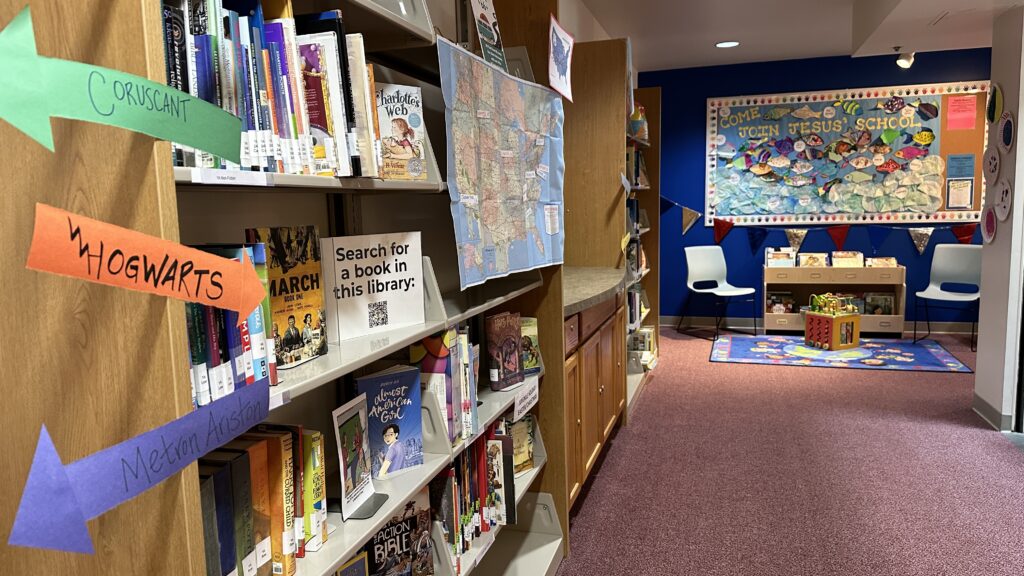
Church libraries were never something that caught my attention. Growing up, the library in our church was just a big room our parents used for meetings. I remember liking the soft carpet and thinking the wallpaper was weird. I don’t remember ever checking out a book or considering the possibility.
In my six years at Derry Church, I had a similar relationship with its library. No weird wallpaper, but it was just sort of there. A space I crossed through to get to other places or maybe stopped in to use the tables or soft chairs. I grabbed a couple Faithful Readers titles when I couldn’t find them at other libraries, but never looked or borrowed beyond that. Besides, the books had to contain heavy religious topics that would depress me, confuse me, or put me to sleep, right?
A library epiphany was coming.
It was January, and Tuesday night fellowship was bustling. The parents had a few hours to wait, and I realized idle hands could be doing something helpful. I asked committees and staff for things we could do.
One evening, Kristy Elliott approached me and asked if we’d be willing to do something to promote the library. She is part of the library committee (did you know there was such a thing? I didn’t!) and they had been working diligently to modernize and zhuzh up the space and its collection. Now they needed people to notice. Why not? I could throw together some signs and face some books with neat looking covers out towards the passersby.
Since it was almost February, I decided to focus on books about Love. I googled famous literary love quotes and was pleasantly surprised that our library contained many of the titles and authors I was seeing. C.S. Lewis, Maya Angelou, Anthony Doerr, Jane Austen, J.K. Rowling, Elie Wiesel, Dr. Seuss, the list went on and on.
I became well acquainted with our online catalog, which I didn’t realize had been featured on the homepage of Derry’s website all along. It holds electronic, searchable records of EVERY title and produced 55 titles for my “love” keyword search. I was impressed.
I quickly realized this library space wasn’t just a few dusty old books about the Protestant Reformation. There was good stuff there, and lots of it! Biographies, poetry, new fiction, local history, cookbooks, children’s picture books. Books for everyone, even lovers of literary fluff like me. And the shelves on religion weren’t just full of dated or overly cerebral topics (but those are there too if that’s your bag). There are stories and studies of faith from varied perspectives. And not just our protestant faith, but of religious thoughts from around the globe.
Heck with those few signs I promised Kristy. People needed to get in here to see this, to check out these books that Kristy, Courtney McKinney-Whitaker, and Chris Gawron had so lovingly gathered and organized for us. This stay-at-home mom/professional volunteer, lover of Derry Church, quirky theme and décor enthusiast (and creator of self-imposed titles) would be the (un)official Ruth Codington Lending Library Advocate. And I would drench that library in eye-catching thematic fun so it would blend into the background no more!
My initial promise of two monthly themes has turned into seven, and I have plans for more. I am having a great time decorating, featuring book categories, and actually reading what I recommend (our book on Phillis Wheatley is pretty great. Thanks, biography month).
I love watching books disappear off the shelves, seeing congregation members interacting with the space, and getting to know the staff better when they graciously answer my questions for the Staff Shelf. And who isn’t loving the anticipation of what the library-user-driven sermon is going to be when the summer reading challenge winner is crowned?!
The library has reminded me about the greatness of our building and its people. Our building has an amazing book collection, a room full of yarn, gardens to tend, bells to ring, children to teach, a nook stocked with free greeting cards, a full kitchen that produces tons of food and fellowship. There is something for everyone in these walls, a bounty we are so lucky to have. Explore it. It’s for you.
And while you’re at it, talk to the people you find. They’re great, and interesting, and you’ll probably find someone that will enrich your life somehow. That small interaction with Kristy last January gave me a fun new purpose, new knowledge, new insight, and new friends. I love being a part of this place and its people.
What a gift we have in our library. A quiet space to sit or visit with others. A place where kids can play and read together. Walls of diverse titles that entertain and inform us and remind us that it’s ok to doubt, to question, and to imagine. It is yet another reminder that we strive to be an open minded, curious, welcoming group here at Derry Church. You will know we are Christians by our love, AND by our cool set of books.
Roger Zimmer • Property Manager
July 13, 2023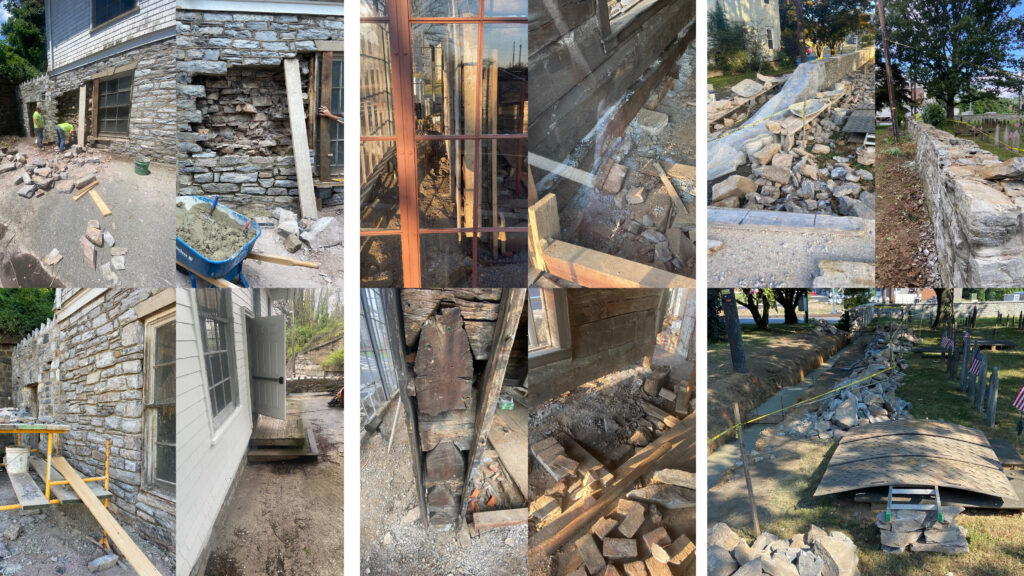
As Property Manager, I am proud to partner with Derry Church’s team of great volunteers that work with me and other staff to continually improve and maintain the church property and buildings.
Since last year, many projects have been completed and even more have been started:
- Late last fall we completed the dismantling and total rebuild of approximately 150 feet of the stone wall surrounding the cemetery that was leaning and falling apart.
- The Session House, built in 1732 as a log cabin meeting place, has been leaning for probably over 100 years, and the bottom log on the north side had rotted. The Building and Grounds committee and others had concerns about it. We hired British Masonry and Restoration, a local specialty contractor, to stabilize the structure. The heavy old brick chimney sitting in the attic was removed and the north wall was lifted to allow the base of the wall to move out approximately nine inches. The bottom rotted log was replaced with an 1800s log beam, and it was supported with limestone slabs. The west wall had supports added and was re-sided with aged barn siding. This will protect the future of this historic structure for a hundred years or more.
- The second phase of the spouting and gutter guard project has been completed with only one more phase to complete the entire building.
- I have worked closely with other committees on projects like upgrading all the signs outside the building and adding the Zoom Room to room 7. With that project we also moved the large screen to Fellowship Hall to make presentation setups much easier in that space.
- The building known to most of us as the Scout House at the rear of the property needed maintenance and repair. We contracted to have a portion of the stone basement wall repaired that was near falling apart, then we had all the wood siding repaired and the exterior painted. Now the building has many more decades of life ahead.
We are always looking at short- and long-term needs and planning the best fix for the problem. A few current projects include the improvement of rainwater drainage in front of the Chapel and the whole rear of the building: that will happen this fall. A contractor is set to repair the inside of the Chapel bell tower and add a safe stair/ladder for future inspection and maintenance of the bell.
We are also adding and improving the lighting in the atrium library to make this a more welcoming reading area.
Next week rooms 4 and 5 will be opened up into one large room as requested by Christian Education. Contractors will move the folding wall from 7AB into rooms 4 and 5 to allow flexible use of that space. The space where the dividing wall was stored in 7AB will become a storage closet.
Pete Feil • chair, Mission & Peace Committee
July 6, 2023This month’s mission focus is on elder care as provided by Christian Churches United (CCU) and its partner agencies. From its earliest beginnings in Harrisburg in 1866, Christian Churches United of the Tri-County Area has evolved to a partnership of over 100 Christian congregations in Dauphin, Cumberland and Perry Counties that work together with concerned individuals, public and private funders, and numerous partner agencies like Derry to support our neighbors in need.
CCU provides a continuum of programs seeking to address both crisis housing situations and chronic causes of housing and financial instability. While motivated by Jesus’ love and example, CCU aids clientele without regard to religion or creed. CCU is united in service and love to those facing homelessness, poverty and incarceration.
One area of service provided by CCU is their HELP Ministries. Through HELP, services are offered to provide shelter, rental and utility assistance, as well as medical or other basic needs. For instance, families under threat of eviction can work with HELP to resolve the issue and remain in their home. During the winter, if a family has exhausted all other fuel assistance programs, they can receive a one-time supply of heating fuel through HELP.
HELP is the point of contact for those needing an emergency shelter as provided by the YWCA, Shalom House, and Interfaith Family Shelter. They then work with the shelter and client to find permanent housing in the area. Financial counseling may be needed to save for a security deposit and to make the initial monthly rental payment. This can lead the family to a long-term solution out of homelessness. In addition, HELP provides aid to those in need of medical, transportation, or food assistance. Thus, a one-time need for a life-sustaining medicine can be met. HELP can also arrange for emergency transportation in specific situations, such as a stranded traveler. Clients in need of food are referred to the Central Pennsylvania Food Bank’s reference guide. Derry’s support of HELP Ministries enables them to provide a vital link with other social services to form a safety net for those in need in the Tri-County area.
Laura Cox • Director, Derry Discovery Days Preschool
June 29, 2023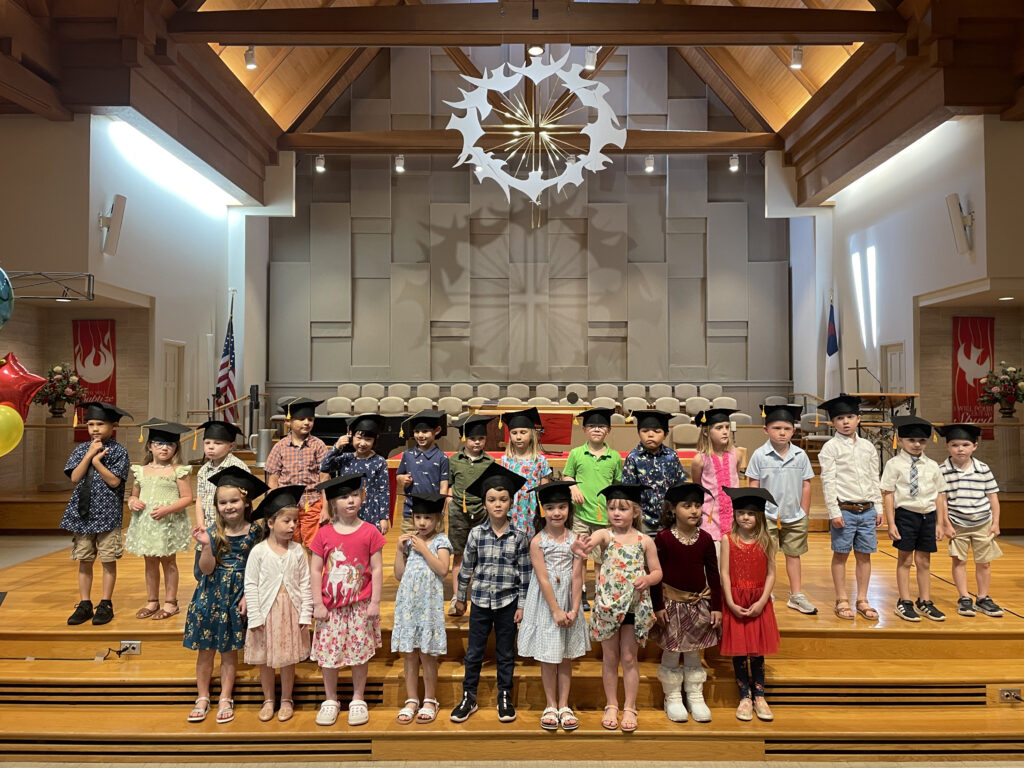
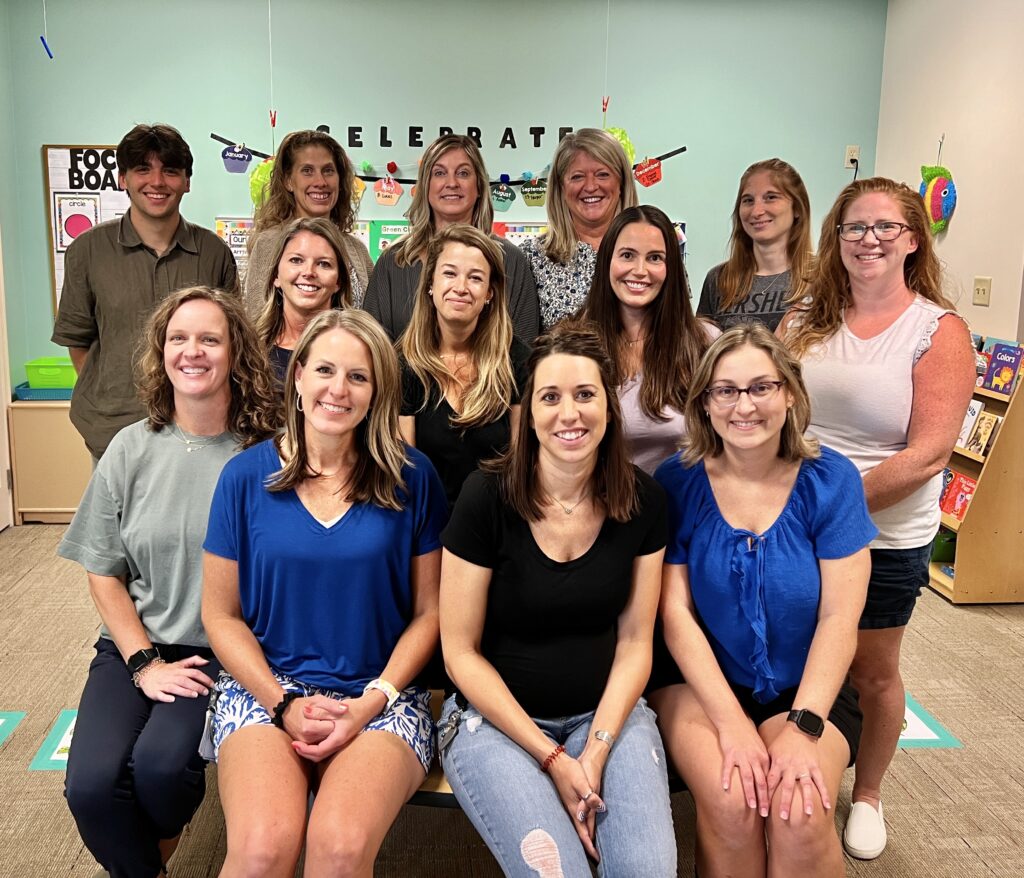
The 2022-2023 school year at Derry Discovery Days just concluded and it was one of our best years yet! We were blessed to have hired five new staff members and their strong backgrounds in education greatly enhanced our program.
In September, we re-opened our Ladybug 1s class led by Miss Jen. This classroom had been closed since March 2020. Twelve students under age two arrived on the first day, having barely been away from their families, if at all, during the pandemic. The growth in these children in even just the first weeks was incredible and it was amazing to see the love they received from their teachers, the friendships formed and their confidence stronger as a result of this warm classroom environment.
Our Turtle 2s led by Miss Morgan and Busy Bee 3s taught by Miss Rachel, also grew tremendously throughout the year, learning through play, working on fine and gross motor skills, early math and literacy concepts and being surrounded by lots of creativity and communication!
25 students completed our Butterfly 4 programs, taught by Miss Jill in the mornings and by me in the afternoons, graduating on May 25. These children enjoyed many engaging units of study throughout the year including space, community helpers, and insects, and focused on all aspects of kindergarten preparation as well as on character traits such as kindness, generosity and teamwork. The students performed several songs at their graduation ceremony. One of their favorites was called “Ready to Go” and they certainly are READY for Kindergarten!
Together we all enjoyed many fun activities including our Halloween parade, a visit from the Hershey Fire Department, our Christmas concert, Ash Wednesday service, Teacher Appreciation Week where we were spoiled by our amazing families, and our annual picnic in May. We also had our second 3.21 for Life Day on March 21. All DDD staff and students received a mismatched pair of socks courtesy of Hayden and Lauren Talhelm and the classes learned about celebrating differences and how all of God’s children are unique and special.
We have openings in our Ladybug 1s class for the upcoming school year. If you are interested in learning more about enrolling, please contact me.. Children must be one year old by September 1 and walking.
We wish everyone a terrific summer.
Rev. Stephen McKinney-Whitaker • Pastor
June 22, 2023
For the last several days Facebook has been reminding me what I was doing seven years ago and last year. Seven years ago, I visited Scotland for the first time and fell in love with the country, culture, and history. We visited Edinburgh, St, Andrews, Glasgow, Iona, Skye, Loch Ness, and more. The trip helped pique my curiosity of the world and my love of travel. Last year, I was in Ireland at this time, exploring the country and learning more about reconciliation and living well together.
I love Scotland and Ireland. I love the landscape and the legends, and yes even the food: Sainsburys grocery stores are the best! I enjoyed the historical sites and appreciated discovering the roots of Presbyterianism, and in many ways the roots of America.
I’m looking forward to returning to Northern Ireland and Scotland next spring with more than 40 friends from Derry Church. I hope they fall in love with these countries as I did, but more importantly come away with a greater appreciation of Celtic spirituality, the roots of Presbyterianism, and the complicated history of the Scots Irish in the British Isles and in America. As a congregation, we’ll explore more about Celtic spirituality next spring during Lent leading up to the trip.
I think the Derry 300th Heritage trip will be an educational, fun, and memorable trip for all. Courtney and I will be leading some classes for the participants leading up to the class about Scottish and Irish history, but anyone can come who may be interested in learning more.
While I’m excited about the April 2024 trip, I may be even more excited about taking our youth and college aged students to Northern Ireland in June next year. We’ll spend a week at Corrymeela where they will lead us in a program about peace, reconciliation, and living well with difference. We’ll take a day trip to Belfast and learn the history of the Troubles as told by both an Irish Republican and a British Loyalist. We’ll spend a day in Derry and worship at First Derry Presbyterian Church, tour the city, and learn more about the Troubles and the peace process. We’ll also have time for some fun, like visiting Giant’s Causeway, Rathlin Island, and Carrickfergus Castle.
This will be a once-in-a-lifetime — and hopefully a life-changing opportunity — for our youth. They’ll not only get to explore a new part of the world, they’ll learn about the history of the Scots-Irish and the difficult societal divisions in Ireland and how they began to heal. They will be given tools by one of the most respected reconciliation ministries on how to live well within a world of difference and be peacemakers themselves.
Youth who are attending will participate in educational classes before the trip so they can get the most out of it, and will need to complete 25 hours of mission work through the church.
This is one way they can more deeply connect with our 300th anniversary next year as they learn the history and visit places like Derry, Northern Ireland.
We hope to significantly offset the cost of this trip so it’s possible for as many youth and college students to attend as possible. If you would like to donate to help make this youth trip possible, please reach out to me or donate to our Empower Youth Fund or through checks notated Empower Youth.
2024 will be a special year for Derry, and not only because of these trips. We will be looking back and looking forward all year with special music, guests, classes, and worship. Even if you won’t be taking one of these trips, you can keep up with the travelers through pictures and stories, and you can participate in all the classes and our Celtic Spirituality worship series next Lent.
As I see the old pictures I took on Facebook, I am filled with anticipation for my next trip and the experiences we will have together.
Sue George • Director of Communications & Technology
June 15, 2023Many of you know our daughter Lynn works as the director of communications at Westminster Presbyterian Church in West Chester. When she comes home for a visit, she and I can’t help but talk shop: how’s the livestream going? How’s the new pastor? What new technology is Westminster using that we should try at Derry? Sometimes we get so excited talking and sharing ideas that Jim has to go into another room and shut the door for some peace and quiet.
There’s one area we talk a lot about but haven’t yet come to any good conclusions: how do we help our live streaming friends stay connected and involved in the life of the church? It’s exciting that our in-person community is growing, yet there continues to be a respectable number of Derry members and friends who participate by live streaming, and I don’t see that changing any time soon. It’s what works for them, and I’m really glad we can offer a robust and welcoming online worship experience for families like the Plassios, new members who live in Texas and worship online with us each week. We may not see these folks in the pews, but they are as much a part of our congregation as those who attend in person.
So how can we extend the warm and welcoming Derry community to these good folks beyond Sunday worship?
We already offer Tech Time on Zoom and Issues Classes to watch live or recorded later. The Communications & Technology Committee has its monthly meeting on Zoom, and the Monday night study group gathered on Zoom regularly this year. While some people could care less about ever meeting on Zoom again, there are others who prefer this format, or because of their circumstances, are grateful for the option. And those are the folks we can’t forget or leave behind even as many return to in-person church.
As Lynn and I scratch our heads over what kinds of virtual gatherings make sense in a post pandemic world, it occurred to me that I could ask you good eNews readers what would be of interest. A prayer group? A class? The ability to attend an existing class or program that is not yet offered in hybrid format? Let me know by sharing your suggestions:
You can be sure I’ll be sharing your ideas with Derry’s staff and with Lynn. She has given me so many good ideas that I’d like to share a few of our good ones with her and the Westminster congregation. Yet I am very much aware that what works in one place may not make sense somewhere else. I’m looking to extend Derry’s offerings in a way that makes sense for our congregation, so that we can continue being the church that proclaims God’s word, shares God’s love, and practices God’s justice.
Claire Folts • Children’s Music Director
June 8, 2023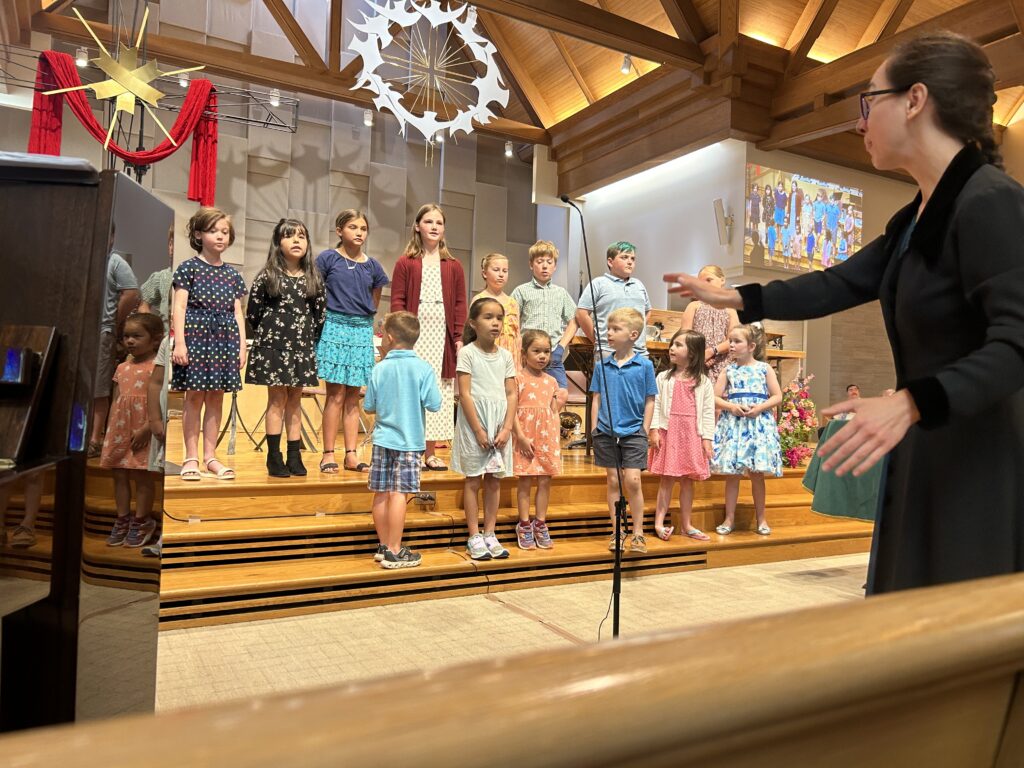
This spring my children’s music groups and I had the gift of time. We sang in worship on Palm Sunday, April 2 and not again until Music Sunday on June 4. Without the time pressure of getting a song ready in a few weeks, we had time to play! And play we did.
On Tuesday nights, my preschool and kindergarten group used their loud and soft voices to help one child find Queen Caroline’s royal scepter, tried to guess who stole my dog’s bone based on the voice who was singing, and flew around like butterflies or crawled like monsters depending what type of music I was playing on the piano. Also on Tuesday nights, my 1st-5th grade group used forte or piano singing to help one child find the “anel” (Portuguese for ring), made sure they DID NOT sing my “poison pattern,” and got a hand clapping pattern faster and faster while singing “Aqua qua” (a nonsense song from Israel). On Sunday mornings, the kids came up with new verses for “This Little Light of Mine” by imagining different places their light could shine and motions to go with them. Some examples include “with my friends” “while climbing trees,” and “on a roller coaster.” I’ll let you imagine the motions!
Yes, this play was fun, and honestly, I’m not sure we need more of a reason than that to keep doing it, but more was happening than fun that only lasted for the 30 minutes I was with them. The kids’ community was slowly deepening. They were learning that here was a group who would cheer for them when they found Queen Caroline’s royal scepter or the “anel”— even the child who hid the scepter or ring cheered, especially if they thought they had found a “super good spot.” Here was a group that if they accidentally sang the “poison pattern” would say, “don’t worry, you’ll get it next time.” Here was a group that when the clapping game got so fast, they couldn’t possibly keep up and would simply collapse onto the ground in a fit of giggles. In other words, we’ve created a space where the kids feel safe enough and are confident enough to take risks and make mistakes because they know the other kids will support them.
Did you notice how many kids sang a solo verse on Sunday in the anthem “Over My Head”? There were FIVE. Not only did they sing a solo, but they each wrote the words to their solo verses. In addition to the five you heard, every single child in my 1st-5th grade group wrote at least one solo verse and sang it on Tuesday night for the group. I doubt I would have had nearly that many volunteers to sing their solo verse in worship, nor would every child have happily written a solo verse (or three) if we hadn’t had time to play together.
As we enter the summer months, we take a break from our weekly gatherings. But the kids continue to see each other. The community we have formed through musical play doesn’t go away, it simply becomes a little less structured. I can’t wait to continue building this community alongside the kids in the fall.